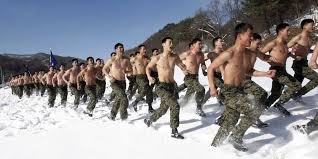Russia Joins U.S. & Turkey In Barring Gays From Military Service
New Data Analysis Finds American Policy Out of Step with Other Democratic Nations
Santa Barbara, CA, – The Center for the Study of Sexual Minorities in the Military (CSSMM), a think tank at the University of California, Santa Barbara, released a new data analysis following a BBC report that Russia has implemented a ban on gays serving in the armed forces. The data analysis indicates that, with the exception of the U.S., countries that bar acknowledged gays and lesbians from serving in the military are much less democratic than those with non-discrimination policies.
Researchers at CSSMM compiled a list of nations that, like the U.S., do not allow known gay and lesbian citizens to serve in the armed forces. They then assigned each of these countries a number representing its degree of political and economic freedom, or a “democracy indicator.” When compared against the average democracy score for countries with gay bans, the U.S. was found to be nearly three times more democratic than other nations with gay bans. Russia’s score was on the undemocratic side of the indicators scale. The upshot is that, while most countries with relatively high democracy indicators allowed gays to serve in their militaries, the U.S. found itself among the bottom half of otherwise democratic countries which ban gay service.
The democracy indicators were taken from two databases, Carleton University’s “Country Indicators for Foreign Policy” (CIFP) project and the non-partisan Freedom House’s “Freedom in the World Country Ratings” (FH) scale. According to the CIFP project, among countries which ban known gays from serving in the military, the average democracy score was 3.4 out of 8, where 1 is the most democratic and 8 is the least. According to the FH project, that figure was 3.3 out of 7. On these scales, Russia scored a 4 and 5 respectively. The U.S. score was a solid 1, the most democratic score possible, making it almost three times more democratic than other nations which prohibit gays from military service. By contrast, the CIFP evaluation found that the average democracy score among nations that do allow gays to serve was 1.3 out of 8, and the FH assessment was 1.3 out of 7, much closer to what the U.S. scored.
The significance of the study, according to Aaron Belkin, Director of CSSMM, is that it shows the American policy to be an anomaly in its insistence on banning known gays in a democratic nation’s fighting force. “These statistics suggest that the U.S. military’s gay ban is out of synch with accepted standards of democracy,” Belkin said. “At a time when the U.S. is sending in troops to spread democracy to the Middle East, it is odd that when it comes to very basic employment non-discrimination, U.S. policy is much closer to Iraq and Iran than Britain and Canada.” Belkin pointed out that twenty-four nations now let gays serve openly in the military, and numerous studies have failed to detect any impairment to military readiness as a result.
The countries which allow gays to serve in the military, according to data compiled by the International Lesbian and Gay Association and CSSMM, are Australia, Austria, Bahamas, Belgium, Britain, Canada, the Czech Republic, Denmark, Estonia, Finland, France, Ireland, Israel, Italy, Lithuania, Luxembourg, the Netherlands, New Zealand, Norway, Slovenia, South Africa, Spain, Sweden and Switzerland. Those which ban gay service, in addition to the U.S., are Argentina, Belarus, Brazil, Croatia, Greece, Poland, Peru, Portugal, Russia, Turkey and Venezuela. The list does not include those countries in which homosexuality is banned outright, such as Iran, Saudi Arabia and several other nations in the Middle East. These countries generally have no stated policy on gays in the military because they do not allow or acknowledge the presence of gays at all.
